Germany has confirmed a EUR 588 million investment for two bilateral tenders under the H2Global program, aimed at bolstering the production and export of green hydrogen from Canada and Australia. This funding, announced by Germany’s Ministry of Economy, is part of a broader effort to diversify Europe’s green hydrogen supply sources, a key resource for energy transition.
Contributions from Canada and Australia will bring the total tender amount to EUR 1.2 billion. According to Hintco, the German state-owned entity managing the H2Global initiative, this mechanism relies on a double auction model. Procurement contracts are awarded to selected producers through tenders, and the procured volumes are resold in the European Union to the highest bidder. The gap between purchase and resale prices is covered by public subsidies.
A Strategic Partnership for Green Hydrogen
This project follows the declarations of intent signed in 2024 between Germany, Canada, and Australia, demonstrating a shared commitment to investing in renewable energy solutions. Australia will contribute EUR 200 million to these tenders, while Canada will allocate CAD 300 million (approximately EUR 208 million). Production will be located in the co-financing partner countries, fostering the development of new international green hydrogen hubs.
The H2Global program, supported by the European Union, has already proven effective during previous auction rounds. The first phase, launched in 2022, included lots focused on green ammonia, methanol, and sustainable aviation fuel (SAF). These initiatives aim to address the growing demand in Europe, where green hydrogen is seen as a viable alternative to fossil fuels.
Challenges and Opportunities in Upcoming Tenders
One of the main challenges from the initial auction rounds has been the complexity of the rules for participating countries. For example, the rule requiring a maximum distance of 500 km between production sites and renewable energy sources has proven restrictive, particularly in Australia, where vast geographic distances are common. Upcoming tenders will incorporate these lessons to simplify processes and encourage broader participation.
Germany’s Ministry of Economy also plans to collaborate with the Netherlands on joint tenders worth EUR 3 billion, approved by the European Commission in December. These projects are part of a broader strategy to import 50–70% of Germany’s hydrogen needs by 2030.
An Innovative Economic Model
The H2Global mechanism is designed to lower production costs and boost the competitiveness of green hydrogen in European markets. By financing the gap between purchase and resale prices, Germany and its international partners aim to make this technology more accessible for businesses and consumers across Europe.
With an overall budget of EUR 3.53 billion allocated for green hydrogen imports between 2027 and 2036, Germany is solidifying its position as a leader in global energy transition. By supporting projects like H2Global, the country also hopes to promote the development of a global green hydrogen market while strengthening its trade relations with strategic partners.






















